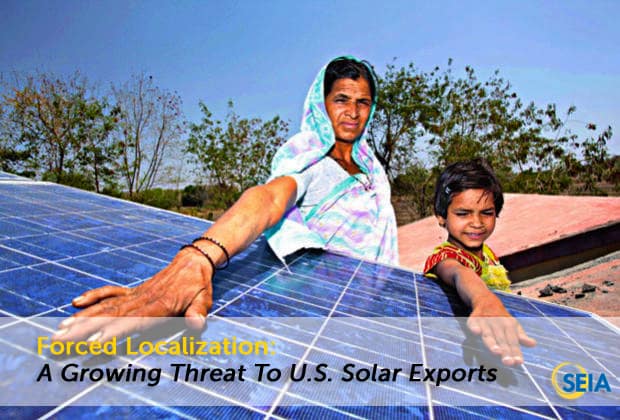Forced Localization - A Growing Threat To U.S. Solar Exports
Thursday, Sep 19 2013

President Obama’s recent decision to install solar panels atop the White House is just the latest example of his strong commitment to U.S. leadership in solar energy and the jobs it will create here at home.
The member companies of the Solar Energy Industries Association strongly share that commitment. Covering every aspect of the solar pipeline, they employ more than 120,000 Americans – providing savings for homeowners, power for our military and a cleaner world for future generations.
As solar energy gains popularity across the globe, more and more countries are recognizing the value of this vital resource in terms of efficiency, cost-savings and of course, as an important step in protecting our global environment. Recently, India joined in the global effort by announcing the National Solar Mission to establish itself as a global leader in solar energy.
But instead of enabling its consumers to access the latest technologies and embracing competition with the world’s solar leaders, India adopted a protectionist forced localization policy that blocks U.S. companies from supporting India in its solar mission.
This policy mandates that all solar cells and panels containing crystalline silicone must be manufactured in India to be sold in India. It bars U.S. products and threatens American jobs in direct contravention of global trade rules. In fact, the World Trade Organization has already ruled against a similar policy in another country. Nonetheless, India and a growing number of other U.S. trading partners are increasing their use of forced localization measures―presenting a growing threat to U.S. solar exports.
As Congressman Henry Waxman (D-CA) rightly noted at a recent House Energy and Commerce Subcommittee hearing, “there are areas where it appears India is pursuing policies that may be inconsistent with its international trade obligations. These practices are damaging to both American and Indian competitiveness in the global economy.”
Shutting out overseas investment will also harm Indian businesses, Indian consumers and India’s green energy future – raising costs and limiting access to the next generation of innovative technologies. Even more alarming, India is considering plans to broaden its forced localization policy to solar “thin film,” a leading U.S. technology and major contributor to the hundreds of millions of dollars of American exports to India over the last few years.
As one of the world’s leading innovators, the U.S. solar energy industry is eager to work with India to help grow its solar base and integrate into the broader global supply chain. But protectionist forced localization policies undercut international collaborative efforts and encourage innovators to look elsewhere for partners and joint research opportunities. The Government of India should realize that these practices will only inhibit the growth of a domestic solar manufacturing base.
John Smirnow, SEIA Vice President of Trade and Competitiveness